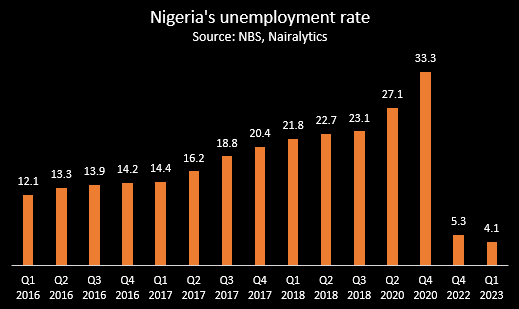The highly anticipated labour force report by the National Bureau of Statistics (NBS) was released on Thursday, 24th August 2023, over two years from the last release.
According to the NBS report, Nigeria’s unemployment rate stood at 4.1% in Q1 2023.
This represents a stack difference from the 33.3% recorded in Q4 2020, which has triggered reactions from several quarters, citing that the numbers do not reflect the reality of the Nigerian job market.
The reactions were following the tough economic and business environment in the country, largely due to high inflationary pressure, FX shortages, and increased operating costs amongst others, which have stiffened the operations of several businesses across the country and is believed to have driven an increase in the unemployment rate.
Highlights of the report are given below:
- About three-quarters (76.7%) of working-age Nigerians were employed in Q1 2023 compared to 73.6% in Q4 2022. This shows that most people were engaged in some type of job for at least one hour a week, for pay or profit.
- About one-third (36.4% in Q4 2022 and 33.2% in Q1 2023) of employed persons worked less than 40 hours per week in both quarters. This was most common among women, individuals with lower levels of education, young people, and those living in rural areas.
- The underemployment rate which is a share of employed people working less than 40 hours per week and declaring themselves willing and available to work more was 13.7% in Q4 2022 and 12.2% in Q1 2023.
- The share of wage employment was 13.4% in Q4 2022 and 11.8% in Q1 2023.

The NBS has attributed the huge difference to the revision of its methodology, which it explained to be in line with the International Labour Organization (ILO) guidelines. Meanwhile, some major differences were noticeable between the two methodologies.
Definition of working age population
The NBS in its latest report considered persons aged 15 years and above as the working-age population. This is compared to an age group of 15 to 64 years adopted in previous surveys.
- While this is in line with ILO’s general definition, it contradicts that of the Organization for Economic Co-operation and Development (OECD).
- According to the OECD, the working-age population is between the ages of 15 to 64 years. It is worth noting that individuals above the age of 64 years are often not in full productive capacity, as evidenced by the retirement age limit of 60 years adopted in Nigeria.
- On the flip side, due to the high level of poverty in Nigeria, with about 133 million multi-dimensionally poor people in the county, individuals tend to engage in working activities even in their old age in other to ensure survival.
Definition of employed individuals
- The new methodology defines employed individuals as those of working age people who engaged in any activity to produce goods or provide services for pay and profit during the review period. This compares with the initial methodology of anybody who engaged in any productive activity for at least 20 hours a week.
- This significantly increases the pool of individuals who are regarded as being employed, hence, the sharp decline in Nigeria’s unemployment rate from a staggering 33.3% to 5.3% in Q4 2022 and a further decline to 4.1% in Q1 2023.
Periodicity
- The new methodology adopted by the NBS made use of a longitudinal research design, where data is collected continuously over a period of time compared to the initial design where data were collected at a single point in time.
- The new methodology allows the survey to capture changes in data over a period of time rather that what happens at a specific period. This means that the survey would capture if an individual who has a job beforehand loses his or her job and is not involved in any productive activities.
Another notable difference between the two methodologies is the clear distinction between commercial and subsistence agriculture unlike the previous definition of employment in agriculture, which determines employment based on a threshold of 20 hours weekly work.
In the same vein, underemployment is now classified as individuals who worked less than 40 hours in a week but were willing and available to work for more hours unlike the previous methodology, measures just based on a time factor alone (20 to 39 hours weekly).
Why this matter
The labour force report, which highlights the level of employment in the country is a crucial indicator that reveals the state of the job market and its impact on the economy, which informs government policies towards job creation.
The new report reveals promising numbers regarding the Nigerian job market; however, it is still significantly higher when compared to other neighbouring economies in the African region; Niger (0.7%), Ghana (3.69%), and Benin (1.8%).

















Sorry, I see this as just playing with figures. Are you saying that in Nigeria today, out of 100 person eligible to work, 96 are working while only 4 are unemployed. This can not be correct. Incorrect report like this will not help our Government to plan accurately. When you look at the numbers of people that are at home doing nothing after passing out from NYSC, Secondary Schools etc in the last one year, this NBS report is not correct, just an academic exercise.
You need to objectively read the report and why there is a huge disparity between the current figure and now. The definitions as well as parameters has changed. You expect the figures to subsequently change. People that were not initially captured as unemployed are now classified as employed. For example employed are people working for 36-40 hours a week, now it is one hour a week. So more people are now considered employed.
It simply government should no longer prioritize job creation
or providing an an environment that engenders that since most Nigerians are employed.
The statistics is an irresponsible one.
Truly wondering what sort of comedy this is right now because, am not sure there’s any community that has such a low unemployment rate in this country, not to mention Local Government, State, and the country; I guess we will be told to go to court if we disagree 😂
Narrowly fixating on the unemployment rate as the sole indicator to comprehend the underlying challenges within Nigeria’s economy has often proven to be a bit myopic. The heart of Nigeria’s challenge doesn’t merely revolve around a shortage of jobs; it’s deeply rooted in a crisis of productivity.
The extent of weekly work hours, whether it’s just one or a full twenty, holds little significance. Prolonged work hours don’t inherently translate into heightened productivity, increased output, or economic growth for a nation.
A more relevant yardstick for consistent assessment is GDP per hour worked. This measure provides a more accurate gauge of the genuine economic productivity of Nigerian labor. Taking this approach into consideration, our focus should shift towards ensuring that all willing Nigerians possess the necessary skills, resources, and support to generate economic value for themselves, their enterprises, and the entire national economy.
With this apt perspective in mind, policies can be tailored to elevate the GDP per hour of Nigerian workers to align with prosperous nations such as the US, UK, Norway, and others. These nations’ workers contribute between $60 to $85 in GDP per hour of productive labor.